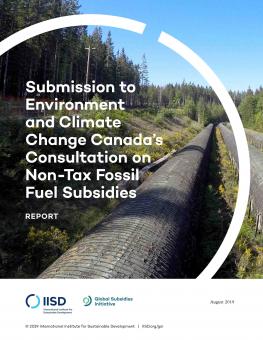
Submission to Environment and Climate Change Canada's Consultation on Non-Tax Fossil Fuel Subsidies
As part the G20 peer review of fossil fuel subsidies, Environment and Climate Change Canada opened a consultation on their review of non-tax subsidies. IISD developed this written submission in response.
Key Messages
- As part of Canada's participation in the G20 peer review of fossil fuel subsidies, Environment and Climate Change Canada opened a consultation on their review of non-tax subsidies.
- The G20 review process is a critical opportunity to scale up climate change action, maximize policy efficiency and ensure public funding is allocated to areas that matter most to Canadians.
- IISD developed a written submission to support the review with recommendations to ensure a thorough analysis of all fossil fuel subsidies and for an action plan for their reform. With the urgency of climate change, the time to act is now.
Subsidizing fossil fuels undermines Canada’s transition to a low-carbon economy. These subsidies lock in the pollution that causes climate change and reduce money available for issues that matter to Canadians, such as healthcare, long-term job creation and education. The good news is that the Government of Canada is undergoing a peer review of fossil fuel subsidies with Argentina as part of its commitment to phasing out inefficient fossil fuel subsidies under the G20.
As part of the review, the government is reviewing two types of subsidies:
- Tax measures, where government revenue is foregone because of tax breaks given to fossil fuel producers. This part of the review is being handled by Finance Canada.
- Non-tax measures, where the government actively spends money on programs that support the production or consumption of fossil fuels. This part of the review is being handled by Environment and Climate Change Canada (ECCC).
In spring 2019, ECCC opened a consultation to receive feedback on how they should review non-tax subsidies. IISD provided feedback and wrote a submission with recommendations on how to make sure the review is as thorough and effective as possible, building on longstanding experience and the work of our Global Subsidies Initiative.
Here’s what we recommended:
- Use ambitious criteria for defining subsidies. The G20 commitment is to address “inefficient” fossil fuel subsidies, so IISD recommends that Canada take a serious look at whether existing subsidies are truly the most efficient way to achieve policy objectives, with consideration of economic, social and environmental costs. If not, they should be reformed.
- Strive for maximum transparency. Canada should publicly release data on existing subsidies so Canadians know how much is being spent. The government should also keep Canadians updated on the process and results of the G20 review.
- Engage the provinces and territories. As Canadians know, what happens federally impacts the provinces and territories. The government should invite the provinces and territories to take part in this federal review. Provinces and territories should also be encouraged to do their own subsidy reviews.
- Reaffirm Canada’s G7 commitment to reform fossil fuel subsidies by 2025. To achieve Canada’s commitments, including emission reduction targets under the Paris Agreement, the government needs to make sure the review process is timely (i.e., completed within 12–18 months) and include a detailed action plan of how Canada will carry out subsidy reform.
Funded by
You might also be interested in
The Cost of Fossil Fuel Reliance
Government support for fossil fuels reached at least USD 1.5 trillion in 2023, new data shows.
Increased Support Needed to Achieve India's Clean Energy Goals
India is on track to achieve many of its 2030 clean energy goals but needs to step up government support measures to accelerate the deployment of offshore wind, electric vehicles, and green hydrogen, according to a new report.
Ending Export Credits for Oil and Gas: How OECD countries can end 2024 with a climate win
For a year now, Organisation of Petroleum Exporting Countries (OECD) governments have been negotiating an agreement that could put an end to oil and gas export finance. Following the acrimony in Baku, this would be a very real way for the OECD to show policy coherence, respond to calls from the poorest countries to stop subsidizing fossil fuels, and shift public finance to solutions.
Fossil Fuel Production, Renewable Energy, and Subsidy Reform in Nationally Determined Contributions 3.0
This policy brief provides an analysis of the critical benchmarks and recommendations necessary for aligning nationally determined contributions (NDCs) with the 1.5 °C target.